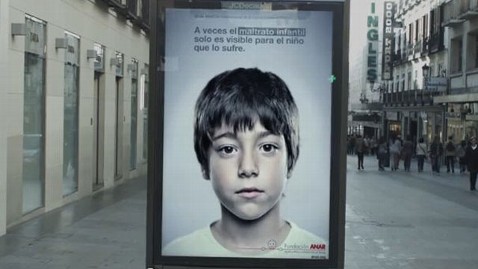Child Abuse Ad Shows Hidden Message for Children
|
|
A Spanish foundation aiming to curb child abuse has a new bus ad that shows a hidden message for children under 10 years old – or rather, children under 4-foot-4.
The ANAR Foundation, which stands for Aid to Children and Adolescents at Risk, has created a bus ad that shows two messages: one for adults and one for children.
“How can we get our message across, even when they are accompanied by an adult?” an ANAR Foundation YouTube video about the ad asks. “How can we get our message across, even when they are accompanied by their aggressor?”
The ad visible to adults, or people over 4-foot-4, shows a child’s face and a message that says, “Sometimes, child abuse is only visible to the child suffering it.”
But under 4-foot-4, the image shows the bruises on the child’s face and a bloody lip. A secret message appears that says, “If somebody hurts you, phone us and we’ll help you,” and a phone number is listed. The tip line is anonymous and confidential, according to the YouTube video.
Grey Group created the ad for ANAR Foundation using lenticular technology to present different images from different vantage points.

Child abuse can be physical, sexual and emotional. Neglect is also a form of child abuse, according to the Centers for Disease Control and Prevention. In 2011, more than 676,000 U.S. children were victims of some form of abuse and another 1,545 died from violence the same year, according to Child Protective Services Agencies.
###
By SYDNEY LUPKIN
Print Version
Tell-a-Friend comments powered by Disqus





